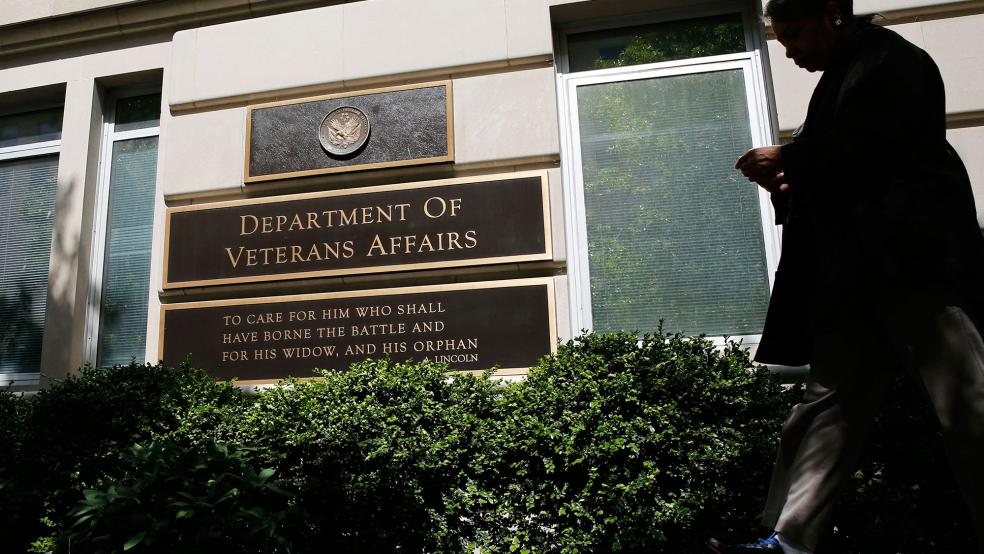Hillary Clinton complained over the weekend about the “drip, drip, drip” of revelations regarding her mishandling of email while she was Secretary of State that has seriously undercut public confidence in her, but she has nothing on the Department of Veterans Affairs.
More than a year after a major VA scandal broke revealing that nearly 40 military veterans had died while waiting for treatment at a VA hospital center, the department has suffered a seemingly endless series of controversies, large and small, that have frustrated director Robert A. McDonald’s efforts to reform the reputation of his beleaguered agency.
Related: The VA’s Bureaucratic Nightmare: Thousands of Vets Died Waiting for a Response
The latest, revealed on Monday in a report by the VA’s Inspector General, addresses the alleged chiseling of hundreds of thousands of dollars by two senior officials of the VA Benefits Administration who orchestrated new job openings for themselves and then collected sizable reimbursements for relocating to new cities.
The alleged scams were so elaborate and costly that the IG has referred the two cases to a federal prosecutor for possible criminal action, while top department officials are conferring on whether to try to force the two women involved to repay the relocation costs.
As part of the alleged scheme, Diana Rubens arranged to be reassigned from her post as Deputy Under Secretary for Field Operations in Washington, D.C. to that of Director of the Philadelphia and Wilmington VA regional offices in June 2014. She billed the VA $274,019 for the move to Philadelphia and arranging for new housing.
Kimberly Graves, working in concert with Rubens, left her position as the Director of Veterans Benefits Administration Eastern Area Office in Philadelphia last October to become director of the St. Paul, Minn., VA regional office. She was reimbursed $129,467 for her moving expenses.
Related: Here’s the Latest Outrage from Veterans Affairs
Ruben’s and Graves’ relocation expenses were generally allowable under federal and VA policy, even though more than a quarter million dollars for Rubens may seem excessive to some. But in both cases, the inspector general said his office found that the women “inappropriately” used their positions of authority “for personal and financial benefit” by first taking action to create the vacancies and then aggressively seeking the new openings.
According to investigators, Rubens used her previous position to create the vacancy by quietly working closely with Graves to arrange to transfer the then-Philadelphia director to fill a vacant position in Los Angeles. Rubens then relinquished her senior post in Washington to move to the Philadelphia office.
The IG said that Rubens admitted that she arranged to move to Philadelphia because she had family in the area. Graves, the former Veterans Benefits Administration Eastern Area director, similarly worked behind the scenes to force out the then-director of the St. Paul VA regional office so that she could claim his office.
“Our analysis of available evidence indicated two directors appear to have been inappropriately coerced to leave positions they were not interested in leaving to create vacancies for Ms. Rubens and Ms. Graves,” the IG report said. “Ms. Rubens and Ms. Graves were in positions that allowed them to effect these transfers and, therefore, misused their positions of authority for their own personal benefit.”
Related: VA Gets to Work, Reduces Backlog of Disability Claims by 84 Percent
There’s another twist to the case. Rubens and Graves arranged for transfers to jobs with far less responsibilities than their old ones, yet they were allowed to retain their annual salaries of $181,497 and $173,949, respectively. Under federal regulations, the VA could not reduce their annual salaries upon reassignment, even with a significant reduction in the scope of their responsibilities, unless they subsequently received unfavorable job reviews.
“We made criminal referrals to the U.S. Attorney’s Office, District of Columbia, regarding official actions orchestrated by Ms. Rubens and Ms. Graves,” the report states. “Formal decisions regarding prosecutorial merit are pending.”
There has long been a long-standing controversy over the federal government’s relocation benefits policies and other income incentives that are typically used to recruit and keep top-flight employees. In this case, according to the IG, two veteran VA officials figured out a way to game the system to win transfers to other cities and claim large relocation benefits and related expenses.
The report said that the VA’s chief of staff concurs in the IG’s findings, although statements from Rubens and Graves were not included. Rubens testified at an April 22 House committee hearing on the matter and said that she didn’t know whether she would have moved to Philadelphia without the incentive pay, according to the Daily Caller.
The Veterans Benefits Administration spent about $1.8 million for the 23 reassignments that the IG reviewed between fiscal 2013 and 2015 – and that includes salary increases, incentives to relocate to other cities, and moving expenses. While many of these expenses are allowable under federal and VA rules, the inspector general said that “We determined that [the Veterans Benefits Administration] used moves of senior managers as a means to justify annual salary increases and used VA’s [Permanent Change of Station] program to pay moving expenses for these employees.”
Related: Americans Sour on VA After Health Care Scandal
Annual salary increases totaled about $321,000, while PCS relocation expenses cost about $1.3 million. “Additionally, VBA paid $140,000 in unjustified relocation incentives,” according to the report.





